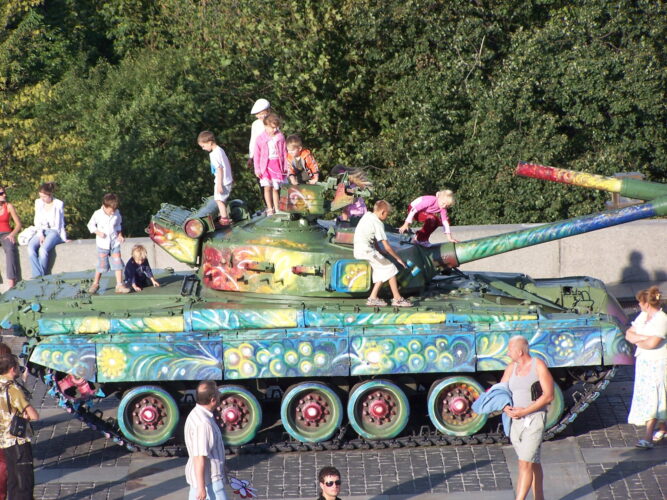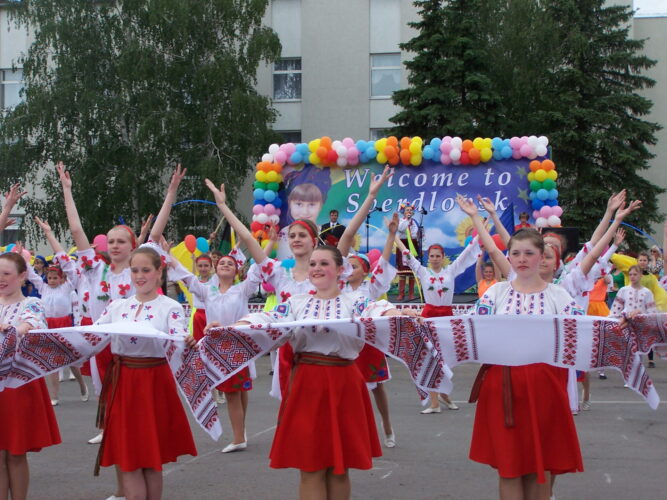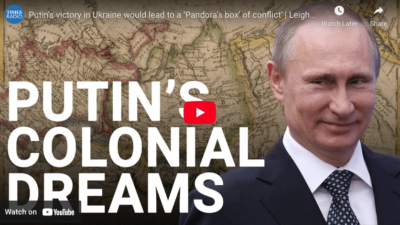Seven reasons why a Russia-Ukraine ceasefire would not be a good way to stop the horrific killing caused by the Russian invasion of February 2022. [Updated 7 November 2022]
Any sane person wants to stop a war
Many voices have spoken out in favour of negotiating a ceasefire with Russia to stop the daily deaths and atrocities caused by the Russian invasion. In Germany, prominent intellectuals argued in an open letter on 29 April that providing weapons to Ukraine could encourage an escalation to nuclear war. They called on Chancellor Scholz to find ‘a compromise that both [sides] can accept’. Philosopher Jürgen Habermas described Russian President Putin as a “war criminal” but said that given Russia’s ability to threaten nuclear war, ‘an end of the war, or at least a cease-fire, must be negotiated with him‘.
Former Chancellor Gerhard Schröder, a friend of Putin’s and supporter of Russian gas exports to Europe, has also argued for a settlement, saying ‘the good news is that the Kremlin wants a negotiated solution’. He urged Germany and France to try to end the war. Jeremy Corbyn, former leader of the Labour Party in the UK, argued in an interview that ‘pouring in arms isn’t going to bring about a solution, it’s only going to prolong and exaggerate this war.’ Mario Draghi, the Italian Prime Minister, called in May for a ceasefire. French President Emmanuel Macron in June said the west should not “humiliate” Putin.
Others have made similar arguments. On 2 August the Financial Times reported on a letter published by the wife of the Irish president, Sabina Higgins. ‘Concerned people of the world anxious to live together in peace… must demand that this war be brought to an end so that lives are saved, and there is a lessening of the suffering,’ she wrote. The Russian ambassador to Ireland agreed: ‘It makes sense. She’s against war. We’re all against war,’ he said.

Would a Russia-Ukraine ceasefire stop escalation?
People also, sensibly, fear escalation. Simon Jenkins, a columnist with the Guardian newspaper, argued in August 2022 that ‘the fates of Ukraine and Taiwan merit every diplomatic support but they cannot be allowed to lurch downhill towards global war or nuclear catastrophe’ He compared western military support for Ukraine to ‘the uncertainties that overwhelmed European diplomacy in 1914… In Taiwan, as in Ukraine,’ he wrote, ‘the west is flirting with disaster.’
A terrifying situation
Russia’s unprovoked war against Ukraine, launched on 24 February 2022, has put the world in a precarious and alarming situation. Russia has threatened to escalate to the use of nuclear weapons. Russian Foreign Minister Lavrov in April accused NATO of engaging in a proxy war with Russia in Ukraine and said that the threat of a nuclear war ‘should not be underestimated’. The risk of a nuclear war, he said, was ‘considerable’.
Russia again talked up the possibility of using nuclear weapons when President Putin announced his “partial mobilisation”, since suspended, on 21 September. “When the territorial integrity of our country is threatened, to protect Russia and our people, we will certainly use all the means at our disposal,” Putin said. “It’s not a bluff.” But the Russian leadership later rowed back on these threats, the Foreign Ministry saying on 2 November that “preventing any military clash between nuclear power is the highest priority”.
Russian threats about nuclear weapons are intended to be frightening. We should be frightened. A nuclear attack – no matter whether using tactic or strategic nuclear weapons – would be a horrific escalation causing unimaginable suffering. The thought of a country using such weapons, for the first time since the US attacks on Nagasaki and Hiroshima in 1945, is terrifying. Moscow would be delighted if the response of western countries was to push for a Russia-Ukraine ceasefire.
How should we respond?
I disagree with those who argue that providing weapons to Ukraine simply prolongs the war, or that a Russia-Ukraine ceasefire is the answer, for the following reasons:
(i) if countries supporting Ukraine cut weapon deliveries, this will increase the likelihood that Russia wins the war. Remember: President Putin’s goal is the annihilation of an entire country, in order to prevent a democratic Ukraine exporting democracy to Russia and threatening his grip on power;
(ii) if Moscow wins, it will, first, seize Kyiv and install a puppet government. Then it will seek to integrate Ukrainian territory into Russia. It is already doing this in those areas it has occupied. We are witnessing a brutal invasion of a country to seize its territory of a kind we have not seen since Adolf Hitler launched his quest for Lebensraum. Do we really want that to succeed?
(iii) the behaviour of Russian forces in those areas it has occupied appears to include atrocities and war crimes. Legal proceedings will, if they can be completed, eventually uncover the full facts, and bring to justice those responsible. Letting Russia win would lead to many more such atrocities happening across the whole territory of Ukraine;
(iv) a Russia-Ukraine ceasefire would freeze the lines of conflict, with Russia holding large swathes of occupied territory. The chances of Ukraine ever regaining the areas Russia now controls by negotiation after a ceasefire would be nil. Such a freeze would risk repeating the ceasefire after Russia invaded Ukraine in 2014, which left Russia controlling Crimea and parts of the Donbas in the east. It never left them. Russia has since annexed Crimea. A ceasefire would also allow Russia to reinforce its position militarily;
(v) the 2014 example shows that a Russia-Ukraine ceasefire would not bring long-term stability. Any outcome of the war that leaves Russia in possession of more of Ukraine than it held in February 2022 would simply create a new, unstable situation. Moscow would hold onto the territory it controls already, integrate them into Russia, bide its time, build its strength, and launch a new offensive later, following the 2014 pattern;
(vi) if Russia is able to seize and integrate into its territory a chunk of, or all of, its sovereign next-door neighbour, the message this sends to other countries around the world who fancy re-drawing borders would be catastrophic.
Suppose well-meaning outsiders had proposed a ceasefire in 1942, with Germany in control of France, Norway, the Low Countries, the whole of eastern Europe as far as Moscow and St Petersburg, the Balkans and swathes of North Africa, to “stop the killing”? Who in the Soviet Union, the US or the UK would have supported pausing the fighting to hold negotiations?
Against this background, as I wrote in June, ‘the top priority in responding to Russia’s war on Ukraine must be to maintain unity amongst countries opposing the war. Only that will make it possible to keep providing Ukraine with the weapons and material it needs to defend itself against the biggest war launched on European soil since 1945, and slowly to weaken Russia. It is a grim prospect. But the alternatives are grimmer still.’
What about nuclear weapons?
Might President Putin authorise the use of nuclear weapons, if the war goes badly for him? It is unlikely, because there is no possible justification for using them, either in logic or under Russia’s nuclear doctrine; it would cause untold suffering; and it would make Russia an international pariah. But we cannot rule it out. If it happened, it would be a grim day for the world – including Russia. It would:
(i) break a taboo that has stood since 1945;
(ii) encourage many more countries to acquire nuclear weapons; and
(iii) lower the threshold for the future use of such weapons – including against Russia – in future conflicts. This would include countries which are not at present nuclear-armed.
Unfortunately, the fact that such a move would be massively against Russia’s own interests does not make it impossible. That is true of much of what Putin has done since he invaded Ukraine in 2014 – including turning formerly friendly Ukrainians against Russia; persuading Finland and Sweden to join NATO; destroying Russia’s economy; and killing not only countless Ukrainians but also huge numbers of his own soldiers.
Nor, however, can the risk that Russia might use nuclear weapons mean that Ukraine should not be allowed to fight back against an invasion of its territory. The argument that “you have to let a nuclear-armed country win any war it embarks on” makes no sense.
How to reduce the risk of nuclear escalation
The best other countries can do to reduce the risk of Putin authorising the use of nuclear weapons is with deterrence: making clear that any use of nuclear weapons by Moscow would have catastrophic consequences for Russia. The only thing Moscow understands, the argument goes, is strength.
Those supporting Ukraine should also encourage other major powers, including those that have sat on the fence on the Russia-Ukraine war, to make clear that any use of nuclear weapons would be unacceptable. When Germany’s Chancellor Scholz met China’s President Xi Jinping in Beijing on 4 November, he reported that Xi had agreed during their talks that nuclear threats over the war in Ukraine were “irresponsible and extremely dangerous”.
Very true.

Leaders should also avoid comments that are unnecessarily provocative – however incendiary statements by Russian leaders and their representatives may be. They should avoid sanctimoniousness, hubris and triumphalism, lest this make it easy for Russian leaders to argue that “the west” wants somehow to attack, destroy or weaken Russia. They should also bear in mind that most Russians, whatever they are telling pollsters, do not want this war. Many of the brightest and best have already voted with their feet and left the country.
Sanctimoniousness and hubris
A post-script.
I discussed Russia’s war in Ukraine with a top ambassador from a country in the southern hemisphere recently. She said governments in the “global south” were fed up with the US and UK preaching about Ukraine. ‘What about Iraq?‘ she asked. ‘What about Kosovo? What about Libya? If you invade countries without a UN Security Council mandate, you can’t get on your high horse later when someone else does the same thing. Why do the US and UK not get upset about the slaughter of Yemenis, but when it’s Ukrainians, you’re suddenly outraged?’
She cited a senior western diplomat who, speaking to London-based ambassadors recently, had said words to the effect that this is not some far-flung corner of the world, this is right here in Europe.
‘Since when,’ she said, ‘does the world have corners? The world is a sphere, where every part is equally far-flung from everywhere else. Words and attitudes like this seem to suggest that white lives matter more than black or brown lives further away from Europe.’
These are arguments of which politicians in the UK, US and others wishing to oppose Russia’s war should take note. The alacrity with which European governments have accepted refugees from Ukraine contrasts with the reluctance of most of them to accept so many from wars and crises elsewhere. Many people in Africa or Asia do not see Russia as so tainted by colonialism as, say, the UK or France – even if Poles, Yakuts, Chinese, Japanese, Uzbeks, Ukrainians and many others might take a different view.
One may argue that Russia’s war against Ukraine is particularly brutal. Russia’s statements that Ukraine, or Ukrainians, do not really exist reek of genocide. Numerous aspects of Russia’s conduct of the war are notably horrifying. But one might argue that about other invaders, and conflicts. Leaders presenting arguments in favour of action to support Ukraine should always ask themselves: ‘how will what I am about to say stand up to arguments about double standards?’
Russia-Ukraine ceasefire: other resources
Other resources on this site:
Russia-Ukraine war explainer: written in February 2022, about why the war is happening.
Reverse conspiracy theories: why we should recognise that Russia’s war on Ukraine is overwhelmingly the responsibility of Vladimir Putin.
Three things to bear in mind about Russian official statements: Kim Philby, maskirovka and MH17.
My books, including “The Hitchhiker’s Guide to Diplomacy”, coming 2023, which will look at these issues in more detail.
I also recommend this thoughtful piece by Ian Bond of the CER, First help Ukraine win the war, then help it win the peace; and this contribution by Charles Crawford, Ukraine v Russia: Negotiating with a Bully.






14 Responses
This is an excellent post about the incredible difficulty of this situation. There is no simple solution. As you say it is grim to have to wait until it all winds down. But there seems to be no other choice.
Many thanks for this comment.
the analysis is very good and profound. but where it comes to russia using nuclear bombs, you maybe forgot the option of NATO to immediate response. if kijew blows up, half an hour later a russian town does, too. if the russians are sure that that will happen, they might think it over.
That is a question on which I can’t comment. Although you’re right that no-one knows what catastrophic consequences Russian use of nuclear weapons – if it actually happened – would have for Russia itself.
Excellent essay Leigh and many thanks for a highly balanced, intelligent and sober view on a highly complex, if not complicated situation. Such voices need to be heard by people who’s views are only too often from biased to radical. Also because the attention to that horrifying war is losing the attention of the world community and wearing-out as we speak. Strongly believe that we are at a point of no return.
Heartfelt wishes and please keep your voice being heard!
Thanks Martin. Glad it made sense to you. Shares welcome! Hope you both are well.
Very interesting blog Leigh. I enjoyed reading it. Especially the very difficult balance you describe, appeals to me.
I will share it.
Hi Hilde – glad you found it helpful. That balance is a tough one, indeed.
“How can the risk of nuclear escalation be reduced”?
Is Russia’s hydrogen energy strategy concept a possible key to keep a door open to this goal? Which Nord Stream (1 or 2 ?) is better suited to be converted to transport hydrogen ?
Russia cannot permanently occupy a country if its inhabitants are extremely hostile towards it. So what can be the best solution that is acceptable to both sides without losing face?
Saving the world climate, a reasonable border line (closer to the 2014 line) and a faster economic recovery for both countries in sight, as a basis for serious talks on a ceasefire and possibly an early end to this senseless war?
Thanks Ilir. An early and successful end to this senseless war is indeed what we yearn for.
Perhaps a ceasefire could be successful if it gave enough time for the West to wean itself off Russian energy and enough time for whatever succession is going to happen in Russia? Eight years should be enough on both counts so, unless the 2014-2022 cycle accelerates, it should be a safe and feasible policy. China might buy Russian energy, but it will soon be more expensive for China than renewables and the idea of a Russian-China quasi-military accord to link Ukraine and Taiwan seems a bit far-fetched.
Thanks Kit. I am still a bit puzzled as to why, with renewables now – as I understand it – cheaper than most if not all fossil fuels, and the price of the latter sky-rocketing, we are not expanding renewables quicker. What have I missed?
Leigh your assessment is as sharp and informative as ever showing your fab past experience in understanding the two countries. The point about us opening the gates to Ukrainian refugees and not to those from other countries is a very hard one but true. The parallels with WW2 are of course stark and we must remember that Putin worked in Berlin in the early 80s so I am sure he studied and analysed German “recent” history with interest. As to a resolution of this…..at the moment it looks grim, especially with yesterday’s car bomb in Moscow, the first attack on Russian soil. A suitable reason for Putin to overreact again…….I remember my parents telling me how they gad to watch the disaster unfold in the early and mid- 1930s. I am scared to see it unfold again-in real time.
Hi Detlef. Yes, scary times and that is what the Russian leadership wants. A time of great uncertainty.